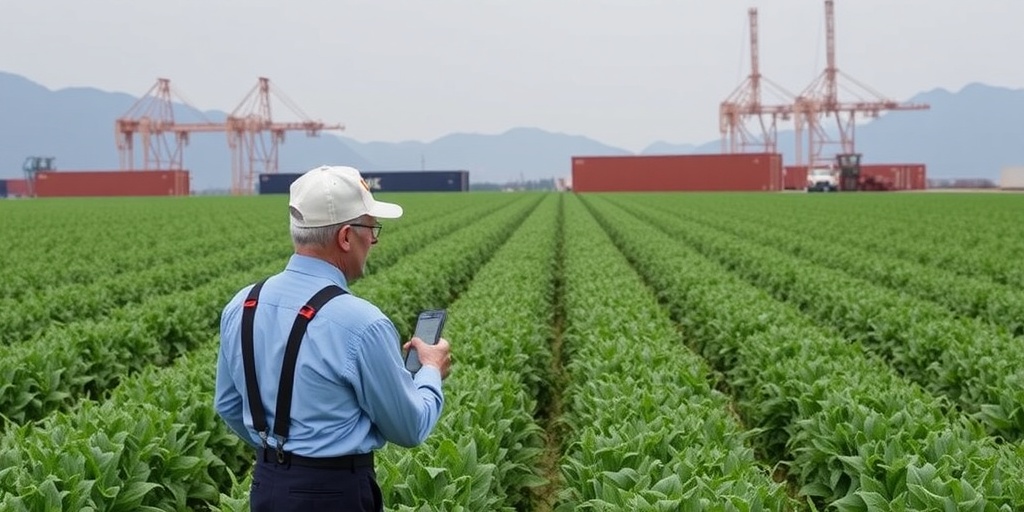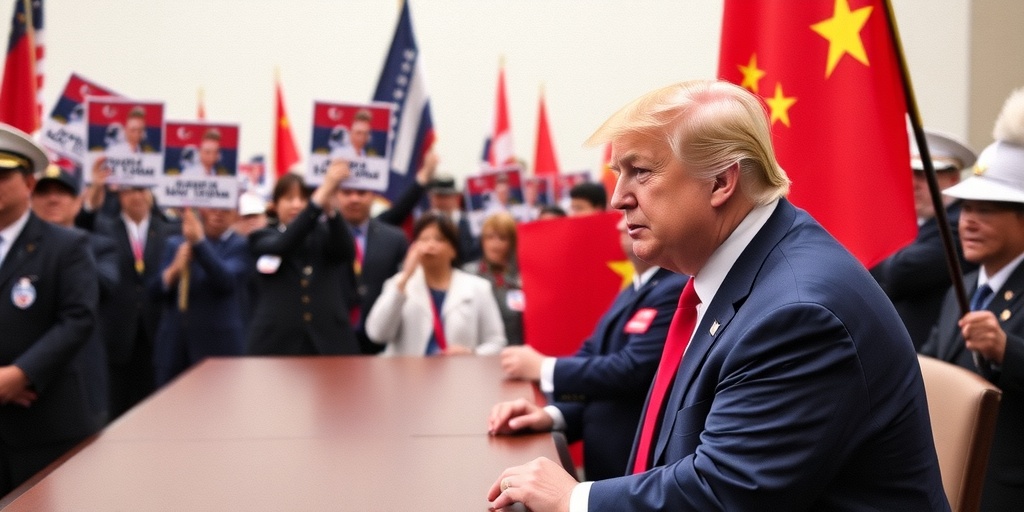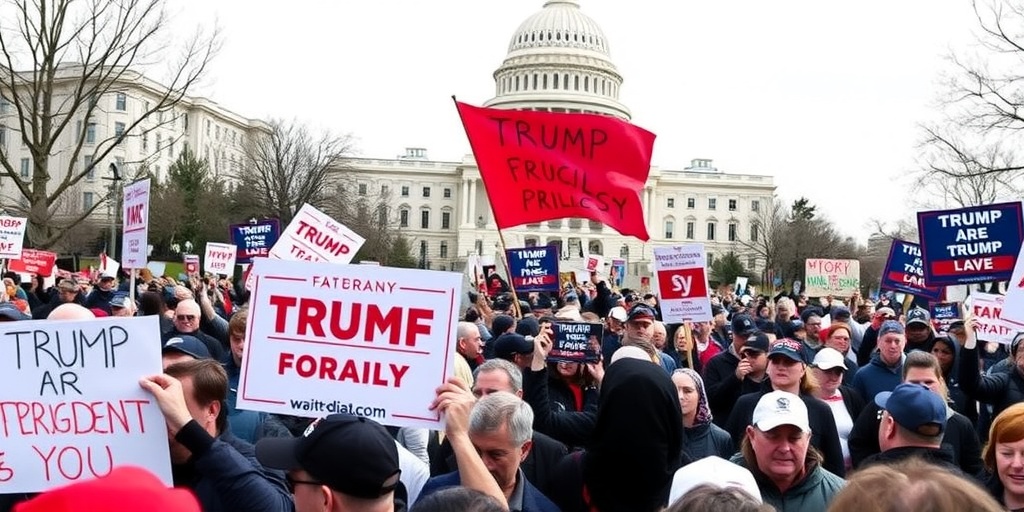Now Reading: Escalating U.S.-China Trade Tensions Threaten Farmers
-
01
Escalating U.S.-China Trade Tensions Threaten Farmers
Escalating U.S.-China Trade Tensions Threaten Farmers

Trade Tensions Escalate as China Announces Retaliatory Tariffs on U.S. Exports
In a significant escalation of ongoing trade tensions, China unveiled hefty retaliatory tariffs on U.S. exports this past Wednesday. In response, U.S. Treasury Secretary Scott Bessent delivered a sharp and somewhat unexpected dismissal of the move, stating, “So what?” This sentiment reflects the Trump administration’s position that the United States holds the upper hand in this trade conflict, arguing that China’s economy is heavily dependent on exports to the U.S.
Currently, the U.S. imports a far greater volume of goods from China than it exports to that country. However, the Chinese government’s response to President Trump’s aggressive tariffs, which have reached as high as 84 percent on American imports, may have more serious implications for American businesses than officials are willing to acknowledge.
Sean Stein, president of the U.S.-China Business Council, expressed concern prior to the latest round of tariffs imposed by Trump. “American companies that have been selling to China and have been enormously successful doing that are not going to be able to continue because of Chinese retaliation,” he stated. This response will have a wide-reaching impact, affecting industries ranging from aviation to agriculture.
One of the sectors most jeopardized by these tariffs is agriculture. The economic reality is that the loss of China as an export market could inflict a substantial blow on agricultural workers, particularly in several states that overwhelmingly supported Trump in the presidential election. In a move that compounds the farmers’ worries, President Trump has raised U.S. tariffs on China even further, even while temporarily ceasing “reciprocal” tariffs on other nations. While this may provide some immediate relief, farmers fear the long-term ramifications of a sustained trade war with their largest export market.
Among the hardest-hit will be those in the soybean industry. China has historically been the biggest importer of American soybeans. When Trump initially imposed tariffs on Chinese goods during his presidency, Beijing retaliated by sourcing soybeans from other countries, notably Brazil. Caleb Ragland, a farmer from Kentucky and president of the American Soybean Association, warned, “If this lasts long-term, we’re going to have a significant number of farmers going out of business. We still bear scars from the last trade war.” His organization has been vocally urging the Trump administration to negotiate a trade deal with China to circumvent a protracted conflict.
Additionally, U.S. corn farmers—who export around 2 percent of their produce to China—are also feeling the pressure from the trade dispute. They welcomed the administration’s decision to temporarily pause tariffs on other countries that could escalate retaliatory actions against American agricultural products. Kenneth Hartman Jr., president of the National Corn Growers Association, highlighted concerns over market uncertainty: “The longer that uncertainty exists, the more concerned we become that our growers could harvest billions of bushels of corn for which they will not have reliable markets.”
This anxiety and stress surrounding agricultural exports were underscored during a recent testimony by U.S. Trade Representative Jamieson Greer before the House Ways and Means Committee. He faced pointed questions from nervous Republican lawmakers fearing additional retaliation from foreign countries against U.S. farmers. Illinois Representative Darin LaHood articulated the prevailing sentiment amongst constituents, noting, “As I talk to my farmers, there’s a lot of anxiety, a lot of stress, a lot of uncertainty, because when we get into a trade war, usually the first pawn in the trade war is agriculture.”
In his defense, Greer noted that “almost all countries have announced that they’re not going to retaliate,” with the exception of China. He cited countries like Indonesia and India that have explicitly stated they would refrain from imposing retaliatory tariffs on U.S. agricultural goods. Yet, he failed to mention that Europe announced its own retaliatory measures recently and that Canada had previously responded to earlier tariff rounds.
Meanwhile, Secretary Bessent downplayed the ramifications of China’s tariff response, claiming on the Fox Business Network that the U.S. exports relatively little to China. “China can raise their tariffs, but so what?” he remarked, despite facing conflict of interest concerns given his substantial landholdings in North Dakota.
As tensions heighten, the retaliatory measures by China may force the Trump administration to contemplate reviving bailout packages for American farmers, similar to those offered during the first term of the Trump presidency. Agriculture Secretary Brooke Rollins acknowledged that a relief package was being considered, stating, “everything is on the table.”
In a follow-up comment on the prospect of reaching a trade agreement with China, President Trump expressed optimism, believing that “we’ll end up working out something that’s very good for both countries.” However, farmers—who typically prefer to avoid government handouts—are increasingly recognizing that federal assistance might be essential if they continue to be caught in the crossfire of trade negotiations. As Ragland concluded, “If we continue to be used as a negotiating tool, and we’re going to be a sacrificial lamb on behalf of the bigger picture, we’re going to have to have an economic package to help us keep the lights on.”
Stay Informed With the Latest & Most Important News
Previous Post
Next Post
-
 01New technology breakthrough has everyone talking right now
01New technology breakthrough has everyone talking right now -
 02Unbelievable life hack everyone needs to try today
02Unbelievable life hack everyone needs to try today -
 03Fascinating discovery found buried deep beneath the ocean
03Fascinating discovery found buried deep beneath the ocean -
 04Man invents genius device that solves everyday problems
04Man invents genius device that solves everyday problems -
 05Shocking discovery that changes what we know forever
05Shocking discovery that changes what we know forever -
 06Internet goes wild over celebrity’s unexpected fashion choice
06Internet goes wild over celebrity’s unexpected fashion choice -
 07Rare animal sighting stuns scientists and wildlife lovers
07Rare animal sighting stuns scientists and wildlife lovers





















